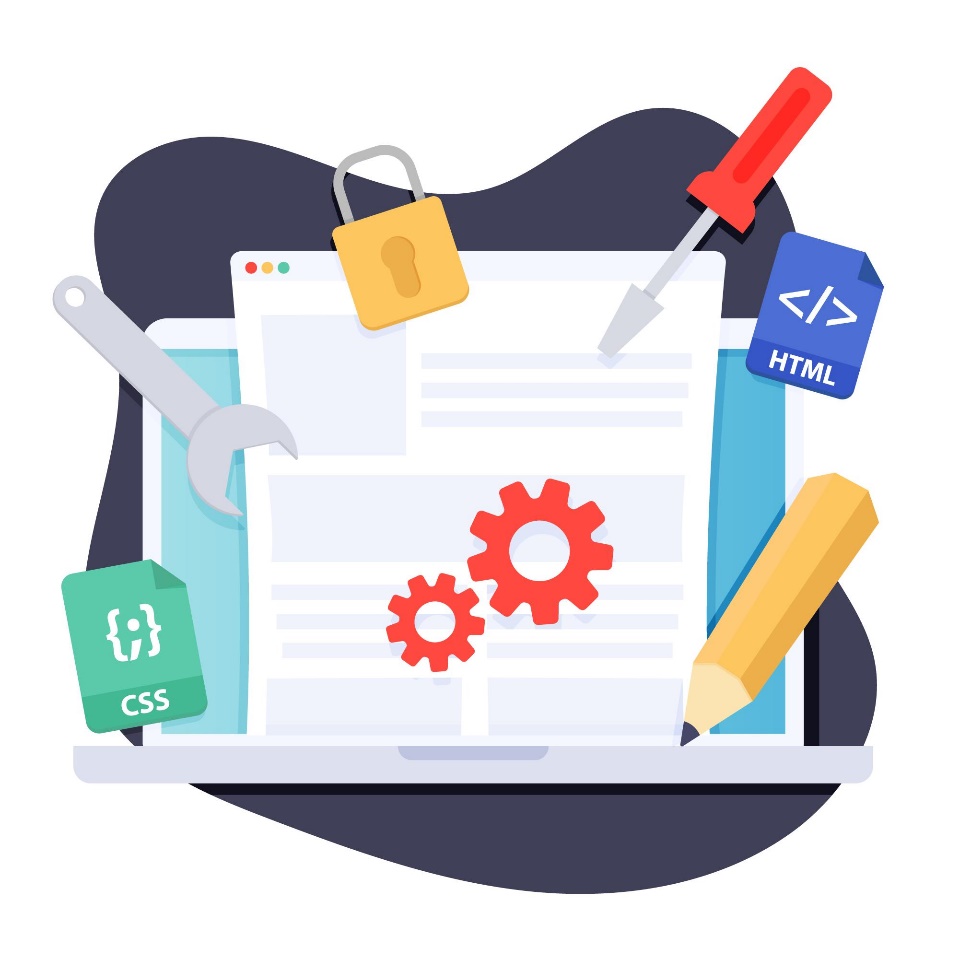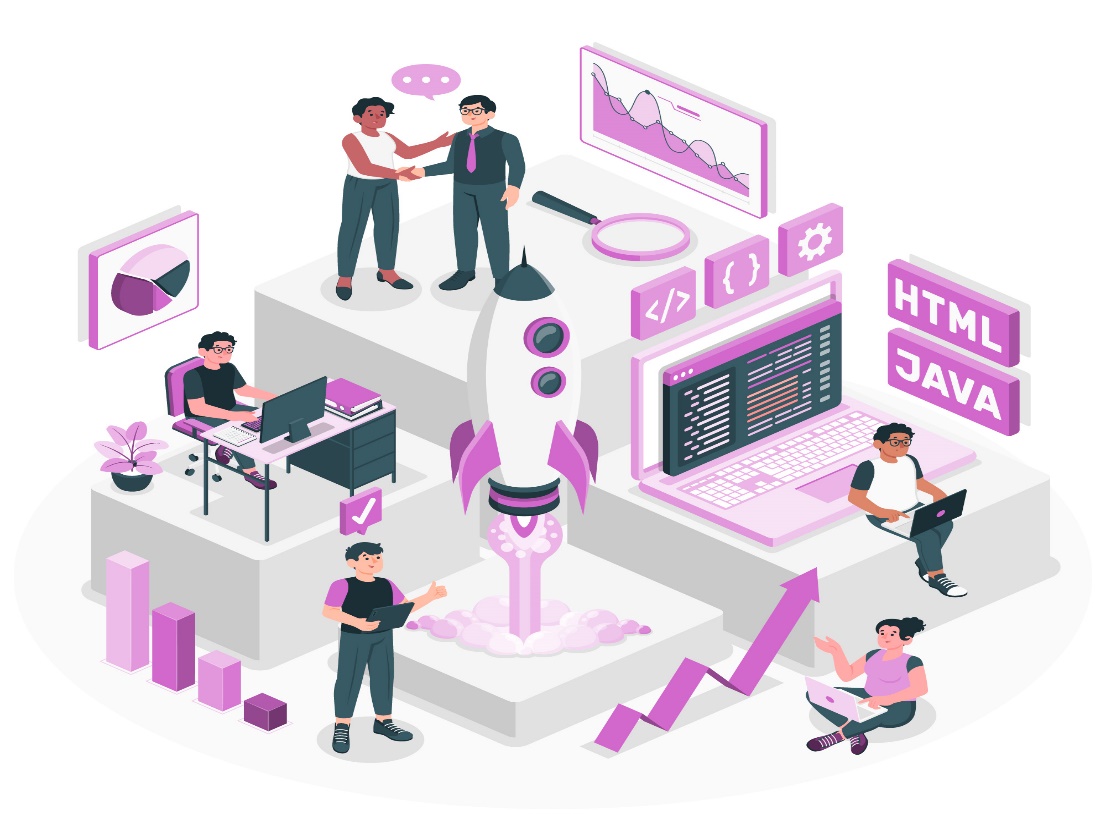"Creating software opportunities to compete in the digital age"
In today's world full of technology and competition, the digital experience is one of the most essential factors of success for any business. Especially in an era of rapid changes and high customer expectations, there is an infinite importance to software and custom programs that accurately cater to your features and goals. Tenetup company, with a team of experts and professionals in the design of custom programs, is ready to help you create a unique digital experience. From designing and developing your specific software to executing complex projects, we will be with you with the goal of increasing efficiency, reducing costs, and enhancing interaction with your customers. In this article, we introduce you to Tenetup's custom software services and will explore how businesses evolve through the use of these services.
What specialized software does a small business need?
The needs of a small business for specialized software may vary depending on the type of activity, industry, and business processes. However, in general, several types of custom software can help small businesses:
-
Customer Management System (CRM): A CRM can help a business manage customer information, establish communication with them, and facilitate improved customer relations.
-
Accounting software: For tracking taxes, managing bank accounts, and producing financial reports, specialized accounting software can be very useful.
-
Inventory and warehouse management software: If your business has products or needs inventory management, warehouse and inventory management software helps better control inventories and orders.
-
Project Management System: Useful for organizing and managing projects, tasks, and team activities carried out in business.
-
Industry-specific software: In some industries, such as medicine, construction, or transportation, you need custom software designed to fit the specific needs and conditions of your industry.
-
Electronic Commerce Software (eCommerce): If your business offers online products or services, eCommerce software can manage online sales and enhance customer experience.
-
Operational automation software: For optimizing business processes and increasing productivity, operational automation software can help.
-
Data analysis software: For analyzing business data and making better decision-making strategies, data analysis software is very useful.

It's crucial for specialized software to address the unique needs of your business, facilitating improved performance and productivity. It's recommended to consult with an IT specialist to determine the exact needs of your business and to develop appropriate customized software for you.
What custom software is needed for a small business?
Larger businesses have more complex needs and processes that require advanced specialized software. Below are examples of specialized software needed for large businesses:
- Enterprise Resource Planning (ERP): ERPs help large businesses improve their financial processes, human resources, inventory, production, and distribution, managing all information in an integrated manner.
- Customer Relationship Management (CRM): Custom CRM for large businesses can help improve customer relationships, manage the sales team, and provide a detailed analysis of customer information.
- Supply Chain Management (SCM): SCM software helps optimize material management, distribution, and logistics in large businesses.
- Business Intelligence (BI) Software: BI software aids in the comprehensive analysis and interpretation of business data, assisting strategic decision-making.
- Enterprise Content Management (ECM): ECM systems help manage and access documents, files, and internal business information.
- Security Software: Large businesses need custom security software to protect against various security threats and safeguard sensitive data.
- Industry-Specific Software: Some specific industries, like telecommunications, energy, engineering, and transportation, need specialized software that caters to the unique capabilities and needs of that industry.
- Operational Automation and IoT (Internet of Things) Software: These applications help optimize and automate production processes, warehousing, distribution, and monitor devices and equipment associated with IoT.
- Advanced Analytics Software: For analyzing vast and complex data and utilizing advanced business intelligence, advanced analytics software is very beneficial.
- Large Project Management Software: In large businesses with intricate projects, powerful project management systems are necessary.
These examples are just a starting point, and the software needs of large businesses can vary widely. Moreover, software selection should be done considering the business's goals, industry, and specific processes, aligning with the business strategies.
Benefits of Custom App Development by Tenetup
Custom applications and software have brought about significant changes for businesses. Tenetup, as one of the leading providers of custom application design services, offers businesses the opportunity to significantly enhance their productivity. Applications and software are designed according to the unique needs and features of the businesses, leading to the following benefits:
-
Increased Efficiency: Custom applications allow you to improve and manage your business processes more optimally. This results in increased efficiency and reduced costs.
-
Better Customer Experience: Custom applications can help you improve your customers' experience and offer better services, leading to increased customer satisfaction and sales.
-
Enhanced Collaboration: With the specialized features of the applications, you can communicate more effectively with your customers and colleagues, enhancing collaborations.
-
Security Maintenance: Custom applications can assist you in preserving the security of your business's vital data and information, and protecting against security threats.
-
Flexibility: These applications provide you with greater flexibility in managing your business and rapidly adapting to market changes and conditions.
Thus, designing custom applications with Tenetup enables you to move more efficiently towards success and capture the market in a more dominating way.
Why Should We Have Software Designed Specifically for Our Business?
Having custom software for each business can have numerous benefits. Below are some reasons and benefits that demonstrate why you should have custom software for your business:
-
Advancement in Productivity: Custom software can aid in the improvement of processes and business productivity. By automating tasks, reducing manual labor and errors, and enhancing performance, your business can achieve greater competitive capability.
-
Personalization: Custom software allows you to tailor processes and working methods according to your business needs and strategy. This enables you to connect with customers and their needs in the best possible manner.
-
Security: A custom software might provide you with a better management and control over your business data's security. You can employ dedicated security technologies to safeguard sensitive information.
-
Alignment with Industry-specific Needs: In some specific industries, there's a need for software with certain features and capabilities. Custom software can help align with the industry's specific standards and needs.
-
Competitive Strategy: Possessing a unique custom software provides you with a competitive edge in the market. It allows you to offer superior services and compete effectively with rivals.
-
Greater Control: You have full control over your custom software, eliminating dependence on third-party software. This enables you to respond to changes and needs of your business.
-
Enhanced Customer Interaction: Custom software can aid in a better interaction with customers. Through customized databases and CRM systems, you can enhance customer information and deliver better services.
-
Future Expansion: Custom software is expandable and can integrate new features, which, as your business grows, allows you to adapt the software to new changes and needs.
Overall, having custom software tailored for your business doesn't just provide solutions to current challenges but also offers adaptability for future requirements. It's an investment that continues to provide value as your business evolves.

Software Development Process
The software development process is a complex procedure composed of several stages. This process usually requires the collaboration of software development teams, software engineers, project managers, and other experts. Below, we explain the major stages of software development:
Requirement Definition
The requirement definition stage is one of the most crucial phases in software development. Here, the project team focuses on gathering and accurately understanding the software requirements of clients and end-users. This is the foundational step for crafting a successful project. In this phase, defining requirements means determining what needs to be accomplished and how the software should function. The project team conducts thorough interviews and analysis with clients and other stakeholders to extract both functional and non-functional software needs.
Functional requirements typically encompass features, functions, and interactions that the software should perform. These requirements need to be explicitly and accurately defined so that developers can code precisely based on them.
Non-functional requirements include attributes like efficiency, security, scalability, supportability, and other software aspects that impose constraints and requirements on the system design.
At this stage, a mutual understanding between the project team and the client must be established to ensure all requirements are properly considered during software development. This stage can be complex, requiring meticulous management and proper documentation to prevent ambiguities and inaccuracies in requirement definition, ultimately leading to effective and efficient software development.
Design
In the design stage of the software production process, the software design team takes responsibility for crafting the overall structure and architecture of the software. This phase of the process has a significant impact on the software's final performance and quality, and it involves critical activities:
- Software architecture
- Data structure design
- User Interface (UI/UX) design
- Determining processes and interactions
- Decision-making regarding technologies and tools
- Design documentation
The design phase is crucial for determining how the software will operate and establishing the foundation for its capabilities. It ensures the software's quality and proper functioning in the subsequent production stages, directly influencing the user experience and the ultimate success of the software.
Implementation
Implementation is a key step in the software development process, which converts initial designs and concepts into source code and materializes the software. This phase is typically carried out after the requirements definition and design phases and involves translating the defined requirements and designs into programming languages and computer codes.
In this phase, software development teams create programming codes. These codes comprise commands, functions, classes, and necessary technical annotations for interaction with the system and performing specific tasks in the software.
The programming team uses various programming languages to write code. These languages can include Java, Python, C++, Ruby, and others, and the choice of language depends on the type of project and business needs.
After the codes are developed, the testing and debugging phase begins. In this phase, programmers identify potential weaknesses and errors in the software codes and correct them. This testing process can be done manually or with automated testing tools.
After the testing and debugging phase, the software is ready to move to the distribution and installation stage to be presented to the final users. Moreover, software maintenance and support will continue after its release.
Testing
Software testing is a crucial process in software development and enhancement, aiming to evaluate quality, performance, and ensure the correct functionality of the software. In this phase, software undergoes assessment to identify and rectify various errors and issues that might have arisen during the development process.
Tests can be conducted manually or automatically. In manual testing, testers perform manipulations and various activities on the software and evaluate its performance based on client needs and expectations. In automated testing, scripts and automated tools are used to execute tests and analyze the results.
Tests include unit tests, integration tests, system tests, and user acceptance tests. They may also cover performance tests and security tests.
The ultimate goal of testing is to ensure the correct performance of the software, discover and rectify errors and issues, and provide reports that give valuable information about the software's quality and performance to the development team. Tests play a vital role in increasing customer confidence in the software and preventing unintended flaws in the product.
Debugging
Debugging is a process carried out during software development to identify, diagnose, and correct errors and flaws in the software's source code. During this phase, programmers and the software development team attempt to identify logical errors, syntax errors, and semantic errors.
To perform debugging, developers use various tools such as debuggers that allow them to observe variables, the flow of code execution, and potential errors. Feedback from users and customers can also be helpful in identifying and rectifying mistakes.
After identifying the errors, programmers work to correct them and execute the corrective codes to fix the errors. Then, re-testing and validation stages are carried out to ensure that the mistakes have been properly corrected, and the software operates as expected.
Debugging is a vital process in software development and contributes to error reduction, increased stability, and software quality enhancement. This process requires experience, precision, and technical knowledge and is repeatedly performed throughout the development of software.
Operational Testing
Operational Testing, also known as User Acceptance Testing (UAT), is a stage in the software production process where the software is tested by end-users or customers to ensure that it operates correctly and meets all business needs and objectives. In this phase, end-users test the software using specified scenarios and test cases. They may also report issues and errors that arise while using the software. Operational testing ensures software quality and its alignment with the actual needs of users and customers. Upon successful completion of this phase, the software is ready to be distributed to customers and moves to the project's final stage and final delivery.
Distribution and Installation
After the software development is complete, installation files and required settings are prepared. These files are made available to users as a software package. For example, suppose a newly established company has developed project management software. In this case, the software package includes executable files, installation documentation, and configuration instructions. Users need to run the installation file and then set up the initial settings according to their needs. After installation, users get acquainted with how to use the software through tutorials and documentation. In case of technical issues or questions, technical support is provided by the developing company to ensure users get the most out of the software and their issues are resolved.

Support and Maintenance
The support and maintenance phase of software follows its release to end users. During this phase, software development teams are responsible for ensuring the software's stable and optimal performance. This phase includes the following:
- Technical support
- Updates
- Version management
- Continuous training
- User data management
- Operational testing
- Reporting and monitoring
The support and maintenance phase plays a crucial role in sustaining the software's performance and ensuring user satisfaction, and it needs to be meticulously managed.
Documentation
Documentation refers to the recording and compilation of information related to software or a project to have its technical and practical information fully and systematically documented. This process is fundamental throughout the software's lifecycle and is vital for software development teams and project management. Documentation includes the creation of technical documentation, user documentation, and documentation related to project management.
Technical documents typically cover requirements of the software, system design, code structure, descriptions of functions and classes, installation procedures, and troubleshooting technical issues. These documents aid developers in understanding the code and implementing changes and improvements.
User documentation is provided to end users and comprises a user manual, feature explanations, tutorials, and any other information users require for successful software use.
Documentation allows developers to accurately manage the software and address future issues and enhancements. It's also crucial for support and repair teams to leverage documentation to quickly identify and resolve issues. Overall, documentation aids in improving software management, communicating with users, and transferring knowledge and information from developers to other team members.
Training and Awareness
Training and awareness are crucial in the software development and production process. This stage serves multiple purposes. Firstly, training assists end-users in familiarizing themselves with how to use the software, leading to enhanced productivity. Secondly, awareness regarding updates and changes made in the software conveys necessary information to users. Effective interaction and communication with users at this juncture are paramount to ensure that they are informed about the software's new features and use them correctly. Moreover, training and awareness also aid support and maintenance teams in optimally addressing user queries and enhancing the software. Overall, this stage ensures the dissemination of information vital for software success and effective user engagement.
These stages succinctly represent the software development and production process. However, each stage might further be divided into sub-stages and executed by various teams. Proper project management, balancing quality with time and costs, and maintaining effective communication with clients are vital for the process's success.
In Conclusion
To conclude this article, the significance of the software development and production process in today's world cannot be overstated. Softwares serve as powerful tools to streamline processes, boost productivity, provide better customer experiences, and achieve business objectives. The software development and production process is executed by expert teams following specific stages and standards. From defining requirements and initial design to implementation, testing, and final distribution, all these stages culminate in the production of a superior and effective software.
Additionally, training and raising awareness among users and support teams play an integral role in software success and sustainability. Ultimately, bespoke software addressing specific business needs and challenges can aid in a business's growth, turning it into an efficient and successful market entity.
Considering the intricacy and significance of the software development and production process, expert teams and efficient management are invaluable in ensuring that software is correctly designed, developed, and managed, supporting business goals.
With Tenetup, what you envision for your future begins today!"


